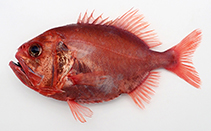| Family: |
Trachichthyidae (Slimeheads) |
| Max. size: |
60 cm TL (male/unsexed) |
| Environment: |
benthopelagic; marine; depth range 9 - 1210 m |
| Distribution: |
Eastern Atlantic: Madeira and the Canary Islands to Senegal, Gulf of Guinea and South Africa. Western Atlantic: southern Scotian Shelf, Canada to Greater Antilles, western Caribbean, Panama and northern Gulf of Mexico (Ref. 7334). Indo-Pacific: off Natal (South Africa), Bay of Bengal, southern Australia, Chatham Plateau around New Zealand, and the Philippines (Ref. 4181). Also in northern South America (Moore, pers. comm.). |
| Diagnosis: |
Dorsal spines (total): 7-8; Dorsal soft rays (total): 13-14; Anal spines: 3-3; Anal soft rays: 11-12. Head with a concave forehead profile and with large mucous cavities covered by tough skin; mouth large and oblique; opercle and preopercle each with a large strong spine; body deep, about 2.1 times in SL; ventral keel with 10 - 14 very robust scutes; caudal fin forked but rounded. Color of head and body is dusky pink, sides with silvery tinge, fins red; tongue and gill cavity blackish; palate white to red (Ref. 7331). Pale beet red to light rosy. Back light red to brownish red, lower sides light silvery gray (Ref. 37108). |
| Biology: |
Lives close to or on the bottom of the upper continental slope. Prefers hard substrates. Young specimens feed on small shrimps and fish (Ref. 4784). A deep sea species, nonetheless, the young are often found near the coast (Ref. 9137). Utilized as fishmeal and source of oil in eastern central Atlantic (Ref. 3695). |
| IUCN Red List Status: |
Least Concern (LC); Date assessed: 19 May 2013 Ref. (130435)
|
| Threat to humans: |
harmless |
Source and more info: www.fishbase.org. For personal, classroom, and other internal use only. Not for publication.
